10W2 Global Studies
Section outline
-
Kia ora Te Wai Whānau Year 10
The first term was taken by Ms. Kate Lambert, who designed the below layout and the first term's work.
My name is Mr. Mitchell (lmitchell@mhjc.school.nz). I look forward to a GREAT year with you all.
For Global Studies this year you will need:- Device and exercise book
- Pens, glue, ruler, colouring in pencils and highlighters
You need to get these out when you are waiting in a line outside our classroom.Once invited in, you need to put your bag in the bag cupboard. You then need to log on to MHOL and go to our Global Studies planning page. You are to read the Learning Intentions, Success Criteria and Learning Activities planned.
This will be our routine and I expect not to ask you to do this but for you to manage yourselves.
- Device and exercise book
-
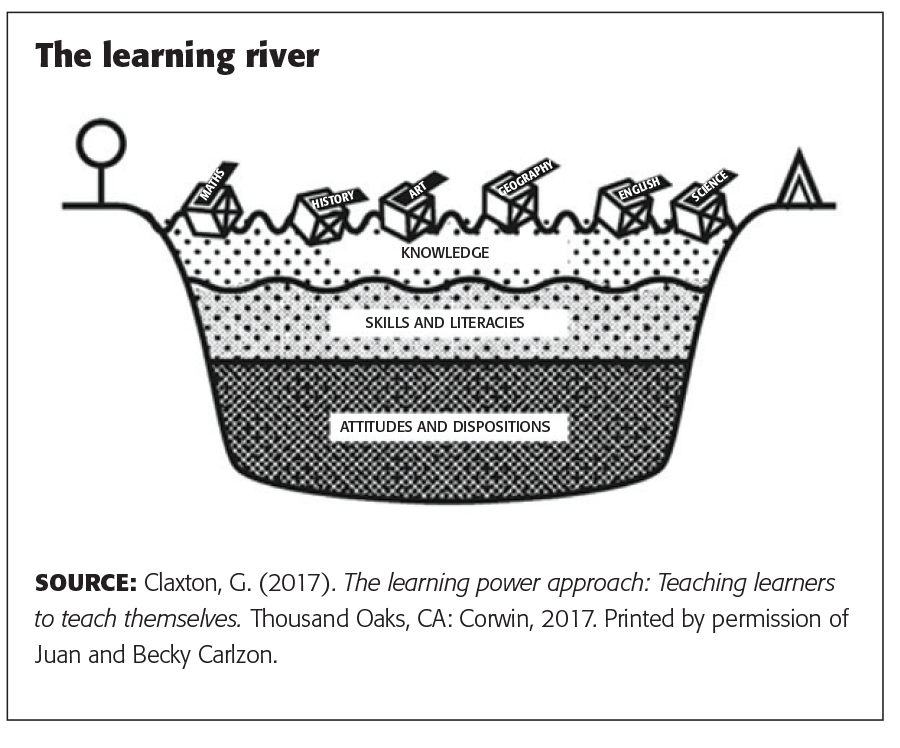
If you look at a cross-section of a river, you’ll see that the water flows differently at different depths. Usually, the flow is fastest on the surface and slows as you go deeper down. But sometimes things look smooth on the surface, while the current below is bubbling with activity. If you judge the river only by looking at the surface, you’ll be misled.
A classroom is like the river. It has different layers of learning going on at the same time. On the surface are knowledge and information: the subjects and topics being studied. They are usually easy to see and describe, and it is straightforward to know how well students have captured them. Also, they tend to move quickly.
Learning Activity:
1. Reflecting on your river of learning
- Hand out - writing sample and introducing yourself as a learner; collected at the end of the session
a) When do you feel unsafe in the river? Times during learning, where you possibly struggle to keep your head above the water?
b) When do you feel as if you navigate the river with confidence? Times during learning, where you make the most of the currents and rapids to have fun and move quickly?
Further Learning .....
Complete the Fun introduction preparation - https://docs.google.com/document/d/1xmBC6vOXc6RvHNmsRPD6c2BUE9jBEnsrAyzyjuYXkGw/edit?usp=sharing -
EXPLORE / TŪHURA learning intentions:
- We are EXPLORING Liveability Factors by locating settlements on maps and identifying where humans choose to live
- We are EXPLORING Liveability Factors by investigating the push and pull factors that make a place liveable
- We are EXPLORING Equity and Equality by comparing resources available to the developing and developed world
- We are EXPLORING Equity and Equality by analysing the resources available to the developing and developed world
- We are EXPLORING People & Communities by comparing the perspectives/values and how these influence outcomes for communities
Success Criteria: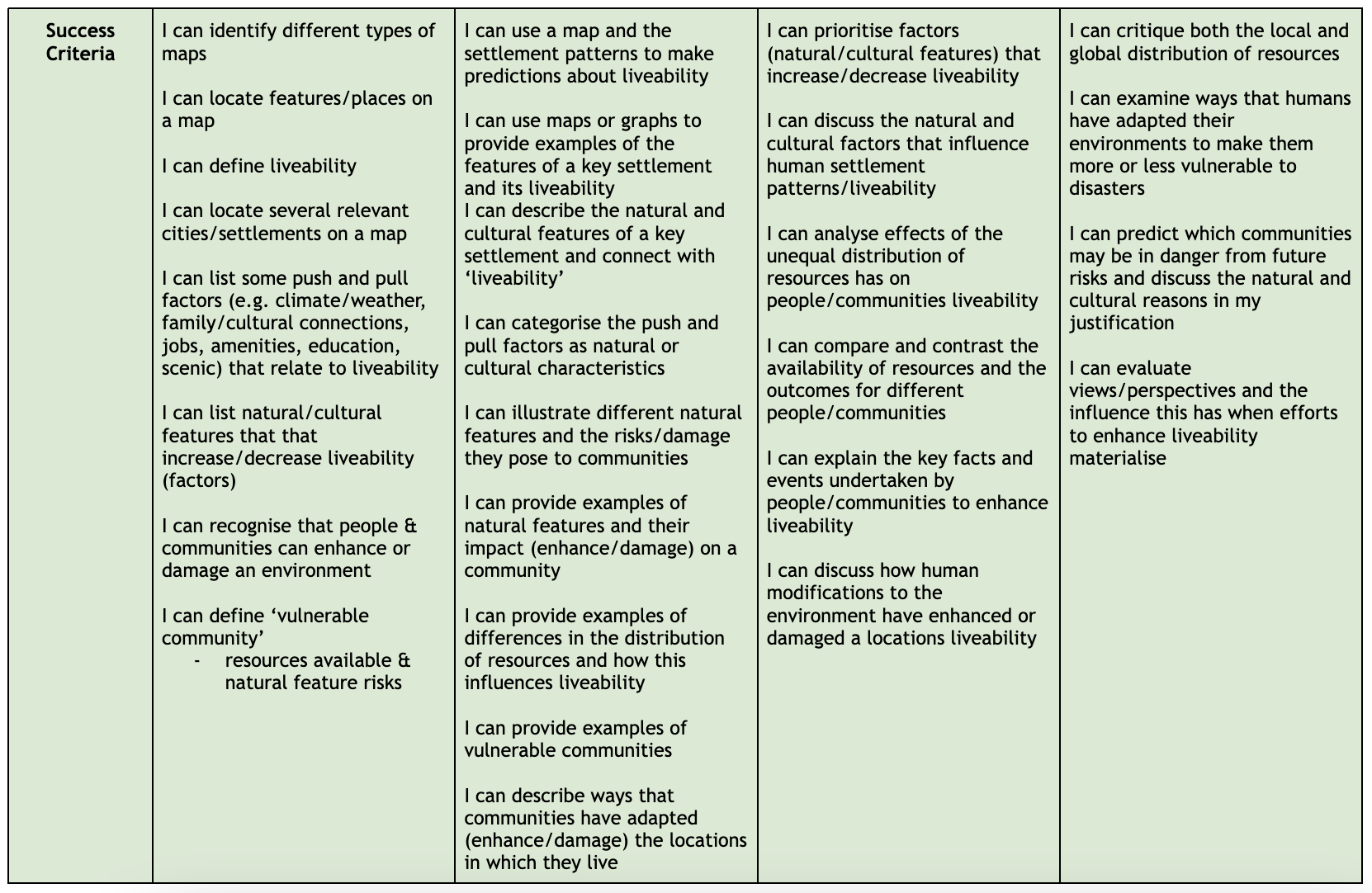
Activities:- Gathering ideas - what do you love and hate about living in Auckland? what do you wish was different about Auckland? Lived else where - what did you love/hate
- T chart in exercise book
- Pair share - Classifying/categorising - Natural and Cultural features and human continuum
Definitions:
natural features = landscape eg with mountains, plains, rivers, coasts etc.
cultural features = with man-made features eg schools, roads, towns, stories, leaders, events, and historical places. - Students to copy the below notes into their exercise book. FACKTS marking schedule
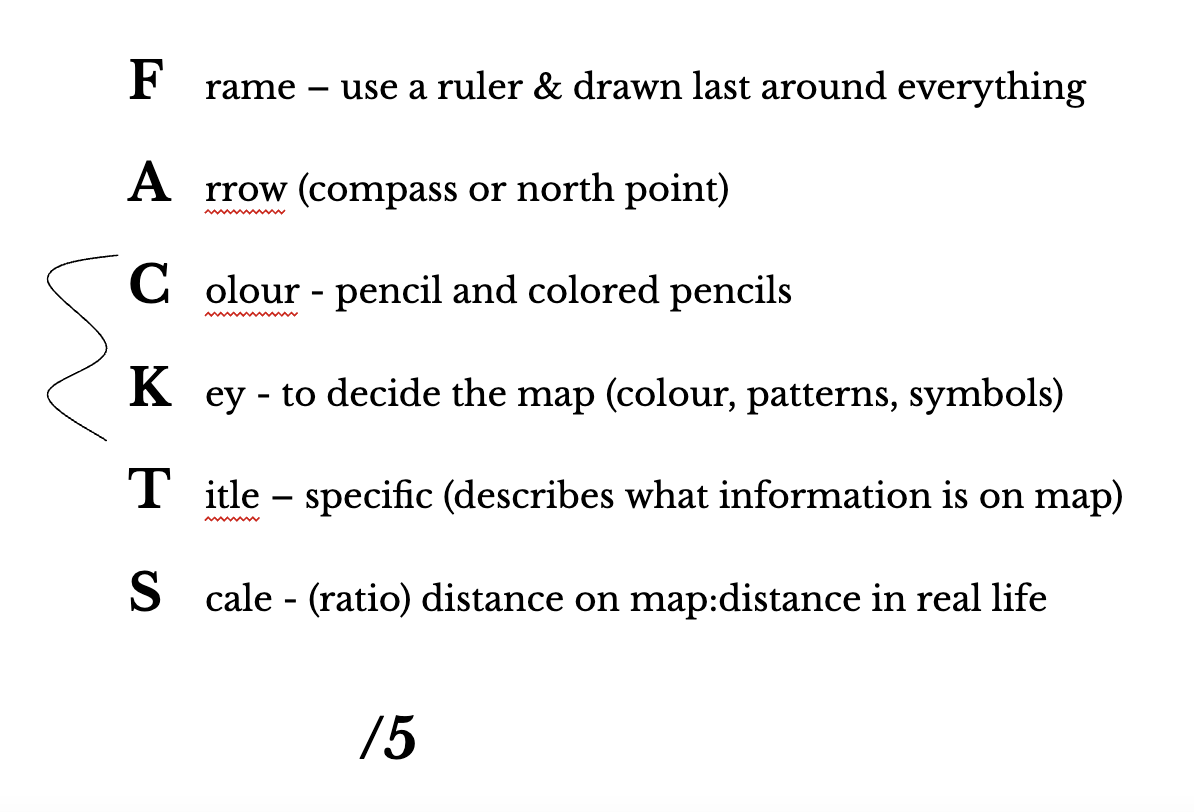
- What are the categories/indicators that researchers gather data about cities when evaluating their liveability?
- as a class review/read the indicators document
https://docs.google.com/document/d/1dp2CPFzbmHGh4AHrjoOsXv4Nhy9Na2loCtVCjMSXuus/edit?usp=sharing - Hand out copy each of the world outline maps. Use the category/indicator information above.....
- The Worlds 2023 Top 10 Most Liveable Cities
- The Worlds 2023 Bottom 10 Most Unliveable Cities
Can you predict the countries they come from?
Using a key and an atlas....
Shade your choices 1x colour for top 10 and different colour for bottom 10
Follow Up Tasks:
Due Thursday 15th FebComplete your Top 10 Bottom 10 liveable cities/countries - prediction/actual MAP
Top 10/Bottom 10 - https://docs.google.com/document/d/19mmfqN-06GqXFFEaIWimgJbFJeNykDpWSET6idQo4tk/edit?usp=sharing
- supporting resources:
Outline map https://docs.google.com/document/d/1R6YkCpdptX93vuG-_uy28oPkgv_w-FzwmrHammfjjaA/edit?usp=sharing -
EXPLORE / TŪHURA learning intentions:
- We are EXPLORING Liveability Factors by locating settlements on maps and identifying where humans choose to live
- We are EXPLORING Liveability Factors by investigating the push and pull factors that make a place liveable
- We are EXPLORING Equity and Equality by comparing resources available to the developing and developed world
- We are EXPLORING Equity and Equality by analysing the resources available to the developing and developed world
- We are EXPLORING People & Communities by comparing the perspectives/values and how these influence outcomes for communities
Success Criteria:

Activities- Students have Transforming te Taiao - liveability from a Māori World View task assigned on Education Perfect to complete
- Any students not in the EP classroom can use this code to join -- WW5XP9
- Peer Assessment - Homework - EP

- Exploring the Kupu
- glossary: written (hand out) and visual definition (in you book using symbols and colour)
- practicing pronunciation - Need headphones/ear buds and Te Aka https://www.maoridictionary.co.nz/
- Quizlet live - shared in the Google classroom - Population density
- Connecting prior knowledge - Push/Pull factors & Liveability
Locate on your NZ map outline
- Where do you think the highest density populations live in NZ - Top 3 areas
- Where do you think the lowest density populations live in NZ - Top 3 areas
Using the Liveability factors - justify your choices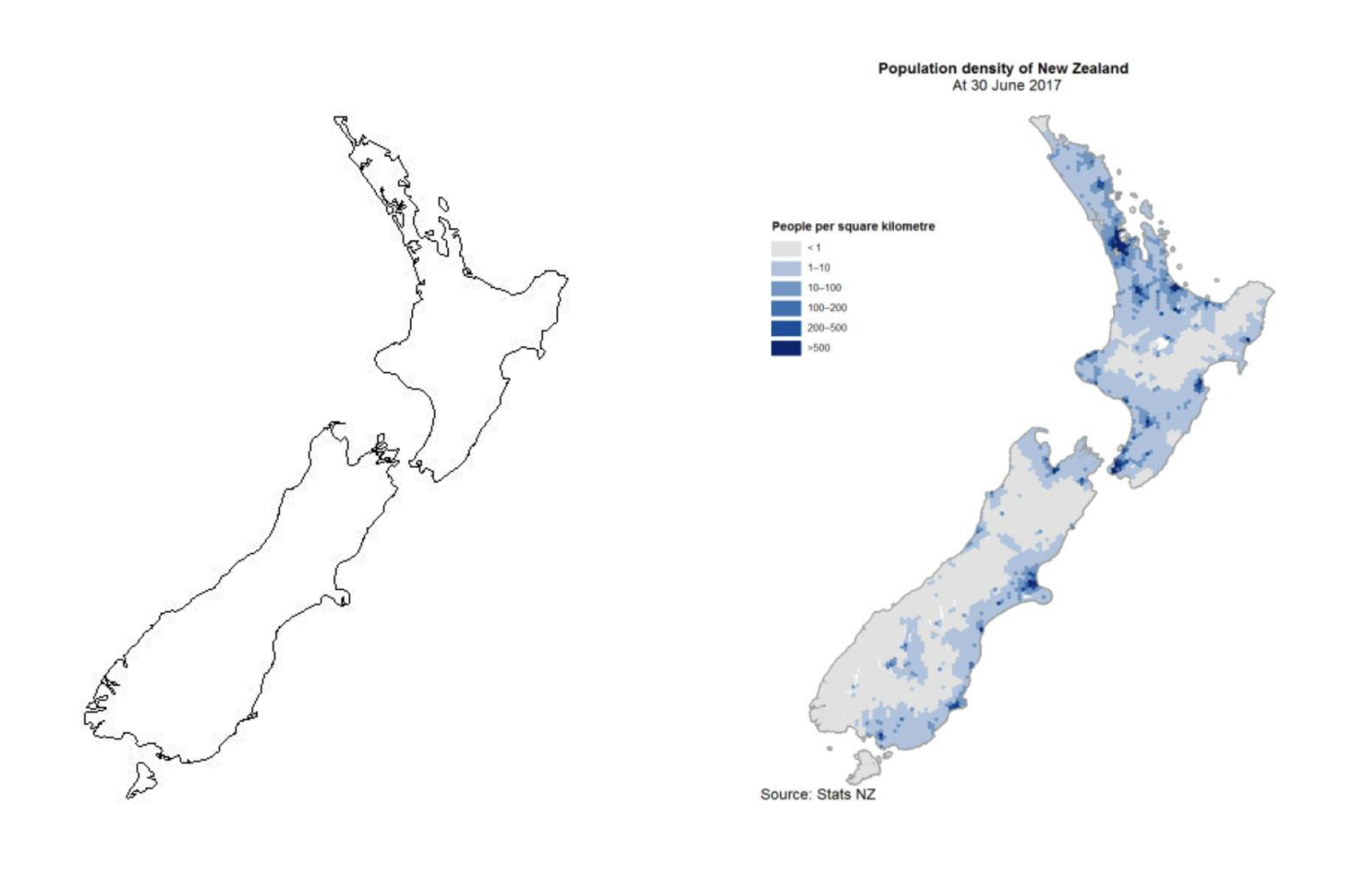
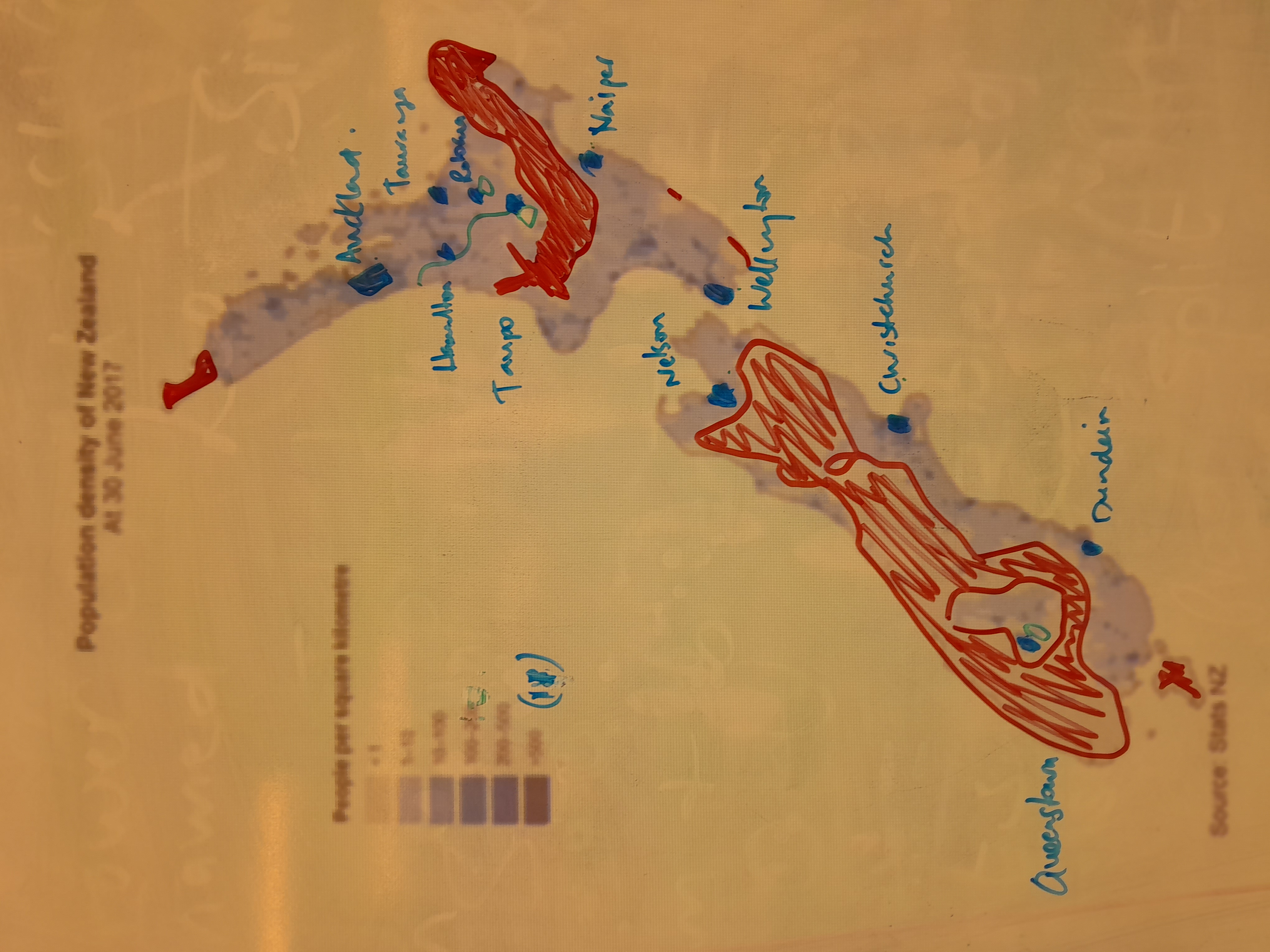
Follow Up Tasks:
Due Thursday 15th FebComplete your Top 10 Bottom 10 liveable cities/countries - prediction/actual MAP - ie for homework add the actual top 10 bottom 10 to your map
Due Monday 19th Feb - find out why your family moved to NZ - 5 reasons - record in your book -
EXPLORE / TŪHURA learning intentions:
- We are EXPLORING Liveability Factors by locating settlements on maps and identifying where humans choose to live
- We are EXPLORING Liveability Factors by investigating the push and pull factors that make a place liveable
- We are EXPLORING Equity and Equality by comparing resources available to the developing and developed world
- We are EXPLORING Equity and Equality by analysing the resources available to the developing and developed world
- We are EXPLORING People & Communities by comparing the perspectives/values and how these influence outcomes for communities
Success Criteria:

Activities-
Connecting prior knowledge - Push/Pull factors & Liveability
- DO NOW : DUE homework due - Push Pull factors
Scavenger Hunt - move around the room collecting reasons why different families in the class migrated to NZ/Auckland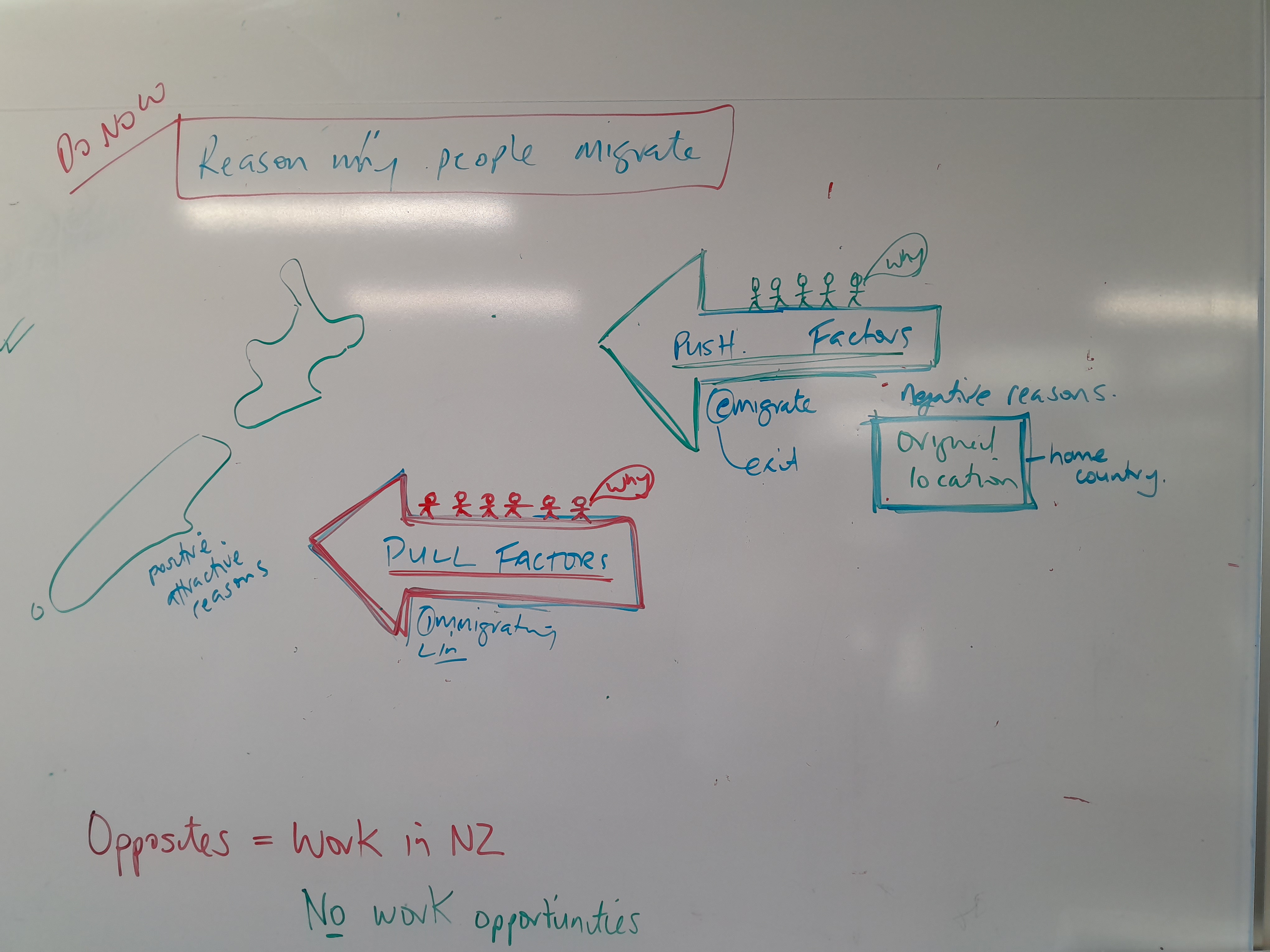
- Venn diagram - compare/contrast Thinking/Learning strategy
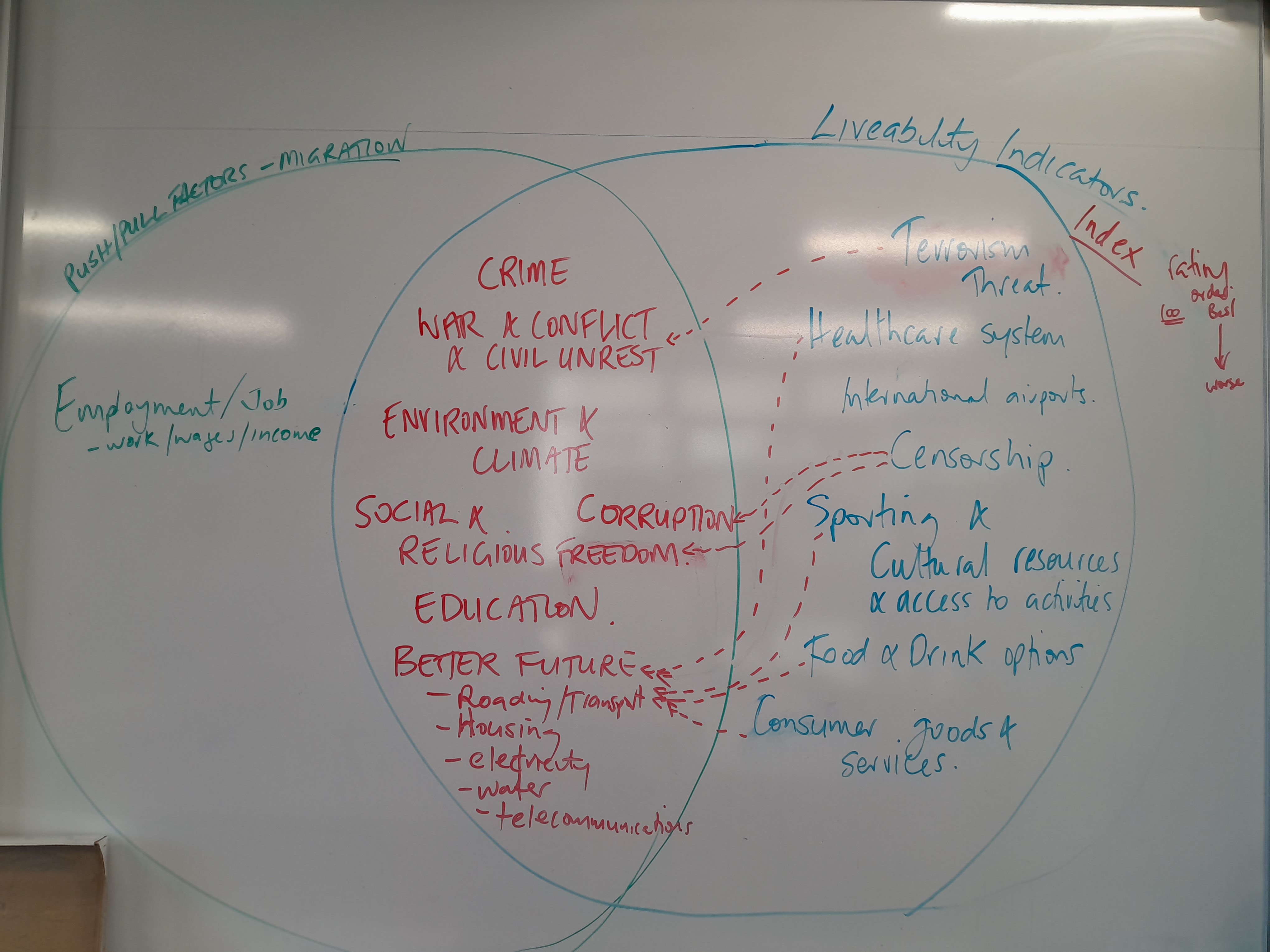
- Writing generalisation statements - using your prior knowledge about liveability factors and migration push/pull factors - explaining reasons for NZ population density patterns
- instructions and writing template in the Google classroom
- finish for Homework (issued Thursday)
Follow Up Tasks:
Due Monday 26th Feb - Writing generalisation statements - using your prior knowledge about liveability factors and migration push/pull factors - explaining reasons for NZ population density patterns
- instructions and writing template in the Google classroom -
EXPLORE / TŪHURA learning intentions:
- We are EXPLORING Liveability Factors by locating settlements on maps and identifying where humans choose to live
- We are EXPLORING Liveability Factors by investigating the push and pull factors that make a place liveable
- We are EXPLORING Equity and Equality by comparing resources available to the developing and developed world
- We are EXPLORING Equity and Equality by analysing the resources available to the developing and developed world
- We are EXPLORING People & Communities by comparing the perspectives/values and how these influence outcomes for communities
Success Criteria:
Activities- Homework Due Monday 26th Feb - Writing generalisation statements - using your prior knowledge about liveability factors and migration push/pull factors - explaining reasons for NZ population density patterns
- instructions and writing template in the Google classroom - DO NOW -
Self assessment and using Learning Intentions and Success Criteria to understand where I am at with my learning.....
According to the teachers planing you have had opportunities to practice/learn the yellow highlighted success criteria...
- number these 1 to 11 in your book
- can you identify the activity relating to the criteria
- how confident do you feel - green, orange or red light, Thumbs up/down, tick/cross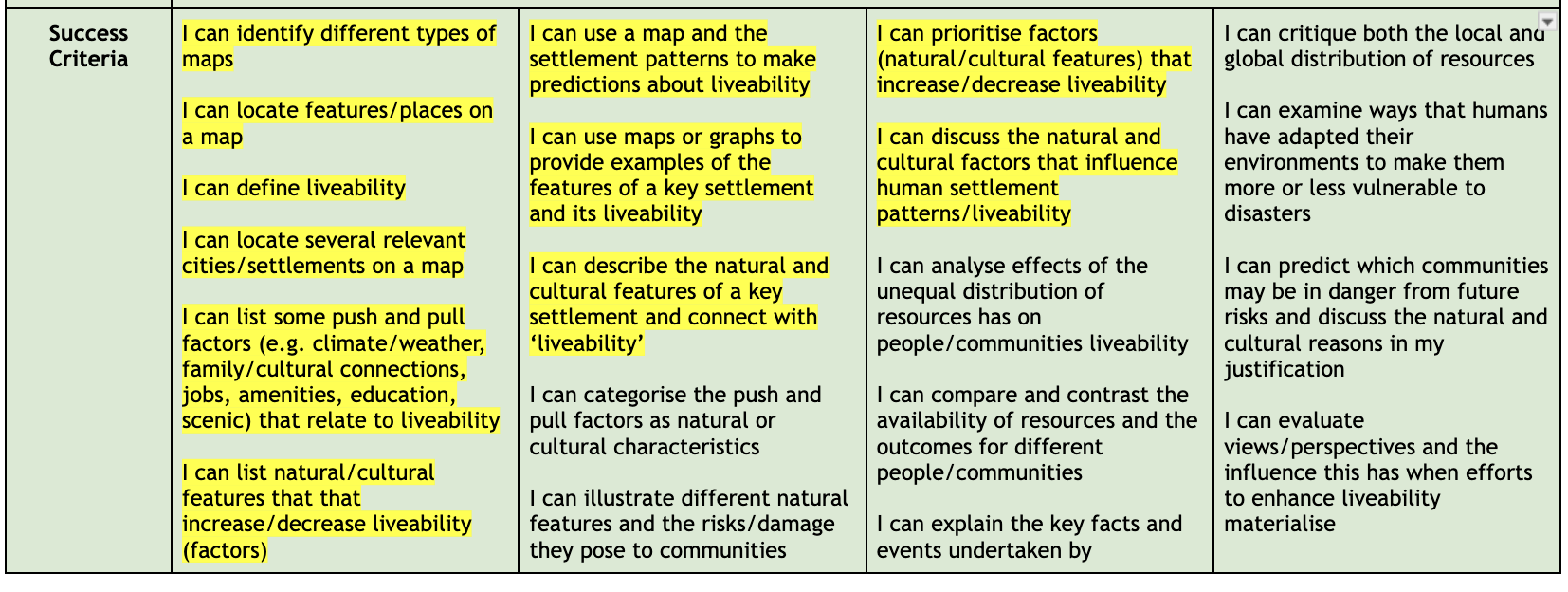
I am stuck help doc - aligning Success Criteria with activities we have completed
https://docs.google.com/document/d/1FNfIbAWVO62hvvZNuK4HAVb4c9RM27m4Y9CfDBW2oxs/edit?usp=sharing - It would seem there is a relationship between people population and positive liveability factors- ie low population = low measurement of liveability factors
- sizeable population = measurement of liveability factors & increasing pull factors for migration
But is there a tipping point - where excessive population who have a negative impact on liveability?
Before we can ask this critical thinking question - we need to EXPLORE the impact settlement(s) have on people, places & the environment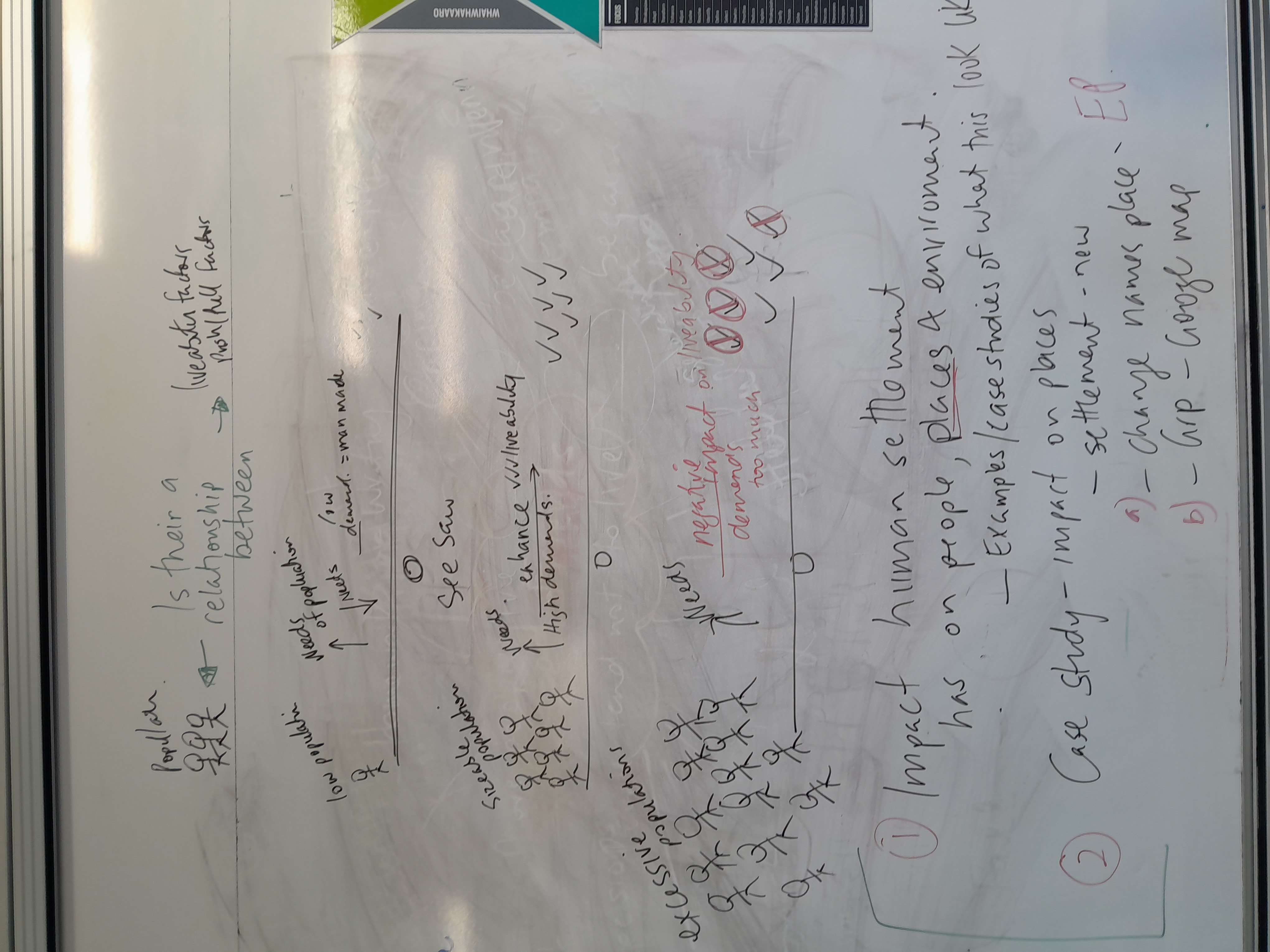
- Impact on places and environment as a result of settlement- colonising the indigenous people and colonising the land
EP activity - Naming and Renaming:
https://app.educationperfect.com/app/dashboard/homework/9388714 - Our local area - identifying original names and names replaced through colonisation
- create you own google map
- see Google classroom for instructions - Literacy Strategy - Expert/Jigsaw
- Understanding Māori Place Names - article
- Literacy Strategy resource - link
Follow Up Tasks:
Due Monday 26 Feb - Writing generalisation statements - using your prior knowledge about liveability factors and migration push/pull factors - explaining reasons for NZ population density patterns - instructions and writing template in the Google classroom
-
FOCUS / ARONGA learning intentions:
- We are FOCUSING on impact of human settlement by researching how the naming and renaming of places and features reflected European origins
- We are FOCUSING on impact of human settlement by investigating how landscapes and ecosystems were transformed over time
- We are FOCUSING on Auckland’s Water by recognising the economic and cultural values that influenced human transformation of the environment
- We are FOCUSING on Auckland’s Water by analysing the impact of changes to the environment on communities
- We are FOCUSING on Auckland’s Water by researching how Tauiwi and Tanagata Whenua cared for the environment (past/present)
Success Criteria: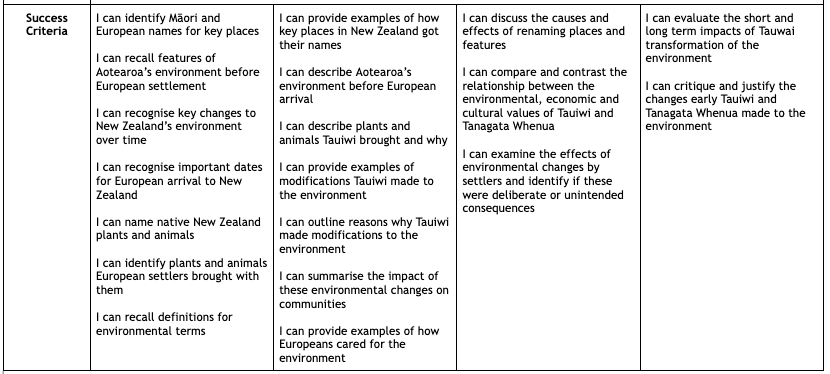
Learning Activities:
1. DO NOW - Monday - Google Maps - Colonisation - share link to your map - Changing Names of Places with research - load in Google classroom
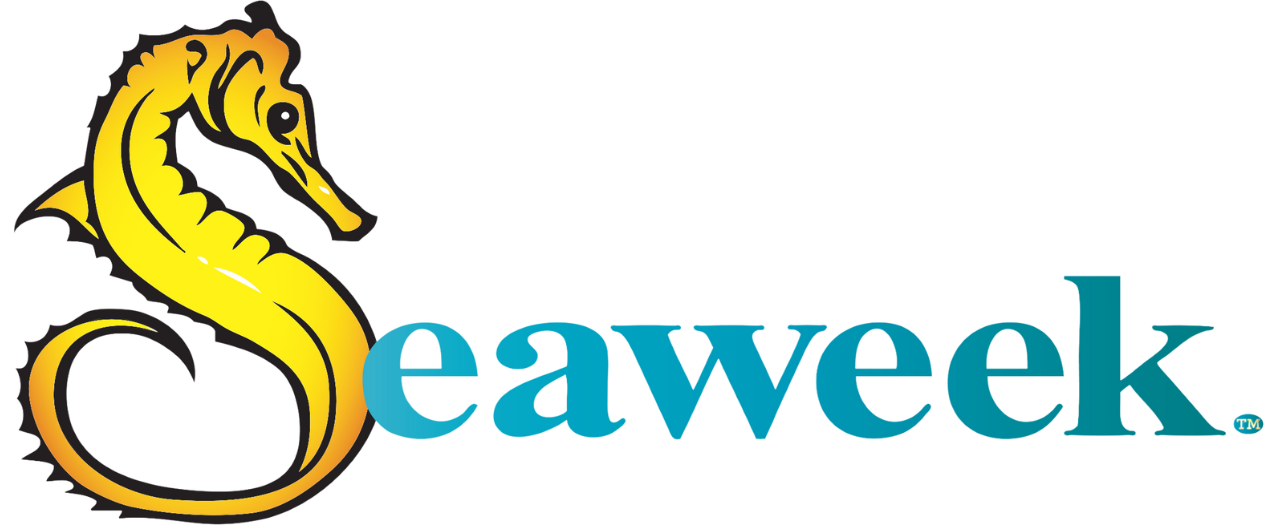
2. Seaweek - LearnNZ Virtual Field trip
Introduction Video
3. Round Robin - building an understanding - working with a partner - choose from the MUST, SHOULD, COULD activities
Each activity requires you to LISTEN, READ, LOOK at VISUALS and complete a QUIZMUST: Fiordland's importance - link
COULD: The history of Atawhenua Fiordland - link
COULD: Fiordland above and below the water - link
SHOULD: Restoring Tamatea Dusky Sound - link
MUST: Why restore ecosystems? - link4. Quizlet Live - for the MUST activities above
Importance - Link
Why Restore - Link5. Environmental guardianship field trip videos
- choose which virtual field trips you want to go on - link6. Take the Google Earth for Web tour - link
- A virtual tour of the field trip with GIS mapping, 3D locations, 360 panorama images, daily diaries and video.
7. Connect with an expert and create their profile on a business card - use canva
- choose an expert - link
- use canva and create a All About Me business card profile - https://www.canva.com/worksheets/templates/all-about-me/
Further Learning.....
-
FOCUS / ARONGA learning intentions:
- We are FOCUSING on impact of human settlement by researching how the naming and renaming of places and features reflected European origins
- We are FOCUSING on impact of human settlement by investigating how landscapes and ecosystems were transformed over time
- We are FOCUSING on Auckland’s Water by identifying the economic and cultural values that influenced human transformation of the environment
- We are FOCUSING on Auckland’s Water by analysing the impact of changes to the environment on communities
- We are FOCUSING on Auckland’s Water by researching how Tauiwi and Tanagata Whenua cared for the environment (past/present)
Success Criteria:
Learning Activities:
- Quizlet Live - for the MUST activities above
Importance - Link
Why Restore - Link - Connect with an expert and create their profile on a business card - use canva
- choose an expert - link
- use canva and create a All About Me business card profile - https://www.canva.com/worksheets/templates/all-about-me/
OR
- brief profile on each - Fauna and Flora
- Definition
- Fiordland Vs Auckland
Sources you could use:
https://www.fiordland.org.nz/explore/natural-wonder/
https://www.milfordlodge.com/news-stories/milford-sound-flora/
https://www.southernlakeshelicopters.co.nz/plants-and-trees-youll-find-in-fiordland/
https://puremilford.co.nz/journal/plants-and-trees-in-milford-sound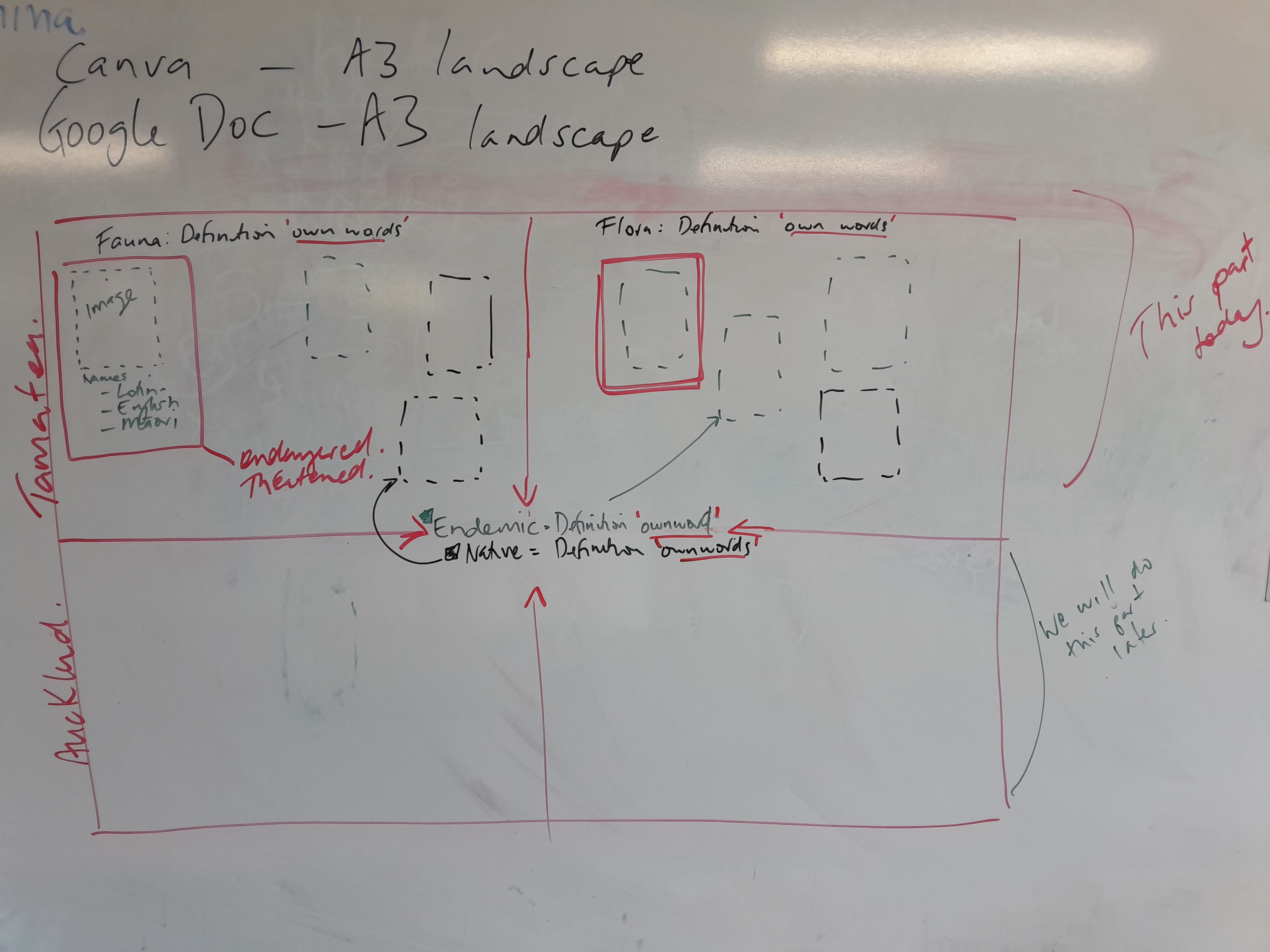
- NZ Land - before people then the impact of Māori & settlers (transforming the land) - Education Perfect task assigned.- posted in Google classroomEP task set - https://app.educationperfect.com/app/dashboard/homework/9553671
Further Learning.....
Your Fauna and Flora definitions /classification exercise - finding image examples of different species for Auckland/Dusty sounds & classifying them......should be completed - this is now HOMEWORK. You have no further class time to work on this.
- DUE: Wednesday -
FOCUS / ARONGA learning intentions:
- We are FOCUSING on impact of human settlement by researching how the naming and renaming of places and features reflected European origins
- We are FOCUSING on impact of human settlement by investigating how landscapes and ecosystems were transformed over time
- We are FOCUSING on Auckland’s Water by identifying the economic and cultural values that influenced human transformation of the environment
- We are FOCUSING on Auckland’s Water by analysing the impact of changes to the environment on communities
- We are FOCUSING on Auckland’s Water by researching how Tauiwi and Tanagata Whenua cared for the environment (past/present)
Success Criteria:
Learning Activities:
- Definition & classifying activity
- Fiordland Vs Auckland
Sources you could use:
https://www.fiordland.org.nz/explore/natural-wonder/
https://www.milfordlodge.com/news-stories/milford-sound-flora/
https://www.southernlakeshelicopters.co.nz/plants-and-trees-youll-find-in-fiordland/
https://puremilford.co.nz/journal/plants-and-trees-in-milford-sound
-
NZ Land - before people then the impact of Māori & settlers (transforming the land) - Education Perfect task assigned.- posted in Google classroomEP task set - https://app.educationperfect.com/app/dashboard/homework/9553671
- Transforming the environment - landscape - Southland
Research skills:
a) Note taking
b) Citation/Reference
Source: https://teara.govt.nz/en/southland-region/page-3 - Protecting the environment - Natural & Cultural - Auckland
Research skills:
a) Note taking
b) Citation/Reference
Source: https://www.aucklandcouncil.govt.nz/plans-projects-policies-reports-bylaws/our-plans-strategies/auckland-plan/environment-cultural-heritage/Pages/focus-area-protect-aucklands-significant-environments.aspx - Auckland - our environment and human impact
- exploring a range of issues: identifying focus for assessment
Further Learning.....
Your Fauna and Flora definitions /classification exercise - finding image examples of different species for Auckland/Dusty sounds & classifying them......should be completed - this is now HOMEWORK. You have no further class time to work on this.
- DUE: Wednesday -
FOCUS / ARONGA learning intentions:
- We are FOCUSING on impact of human settlement by researching how the naming and renaming of places and features reflected European origins
- We are FOCUSING on impact of human settlement by investigating how landscapes and ecosystems were transformed over time
- We are FOCUSING on Auckland’s Water by identifying the economic and cultural values that influenced human transformation of the environment
- We are FOCUSING on Auckland’s Water by analysing the impact of changes to the environment on communities
- We are FOCUSING on Auckland’s Water by researching how Tauiwi and Tanagata Whenua cared for the environment (past/present)
Success Criteria:
Learning Activities:
- Assessment 1 - Instructions and templates loaded in the Google classroom
DO NOW - Read NZ Herald article
https://docs.google.com/document/d/10G2AxfyH6bWX-bYXbWTWoShG3QP9ynhgZqnVPxeklq8/edit?usp=sharing - Assessment 1 Checkpoints
Protecting the environment - Natural & Cultural - Auckland
Research skills:
a) Note taking
b) Citation/Reference
Source: https://www.aucklandcouncil.govt.nz/plans-projects-policies-reports-bylaws/our-plans-strategies/auckland-plan/environment-cultural-heritage/Pages/focus-area-protect-aucklands-significant-environments.aspx
b) Working in your group - By end of the session Monday 25th March
- EXPLORING potential water related environmental issues: Hand out
https://drive.google.com/file/d/138ld--K2q6WsUiRzjIsg6uooPffQdGOh/view?usp=sharing
- PLAN - complete your groups plan: Brainstorming ideas and then Decisions and Responsibilities doc. Template - available as a Material distribution in Google Classroom
FYI - groups have a A2 size of paper to work with
c) Complete your INDIVIDUAL research
Due end of Wed 3rd April
Source List - available for you in Google classroom
Dot & Jot note taking strategy - using the INDIVIDUAL research or Scavenger Hunt research document copied for you in the Google classroom
e) Hand in your assessment - hard copy
DUE: Monday 8th April 2pm
Further Learning.....
Assessment 1
DUE: Monday 8th April 2pm -
FOCUS / ARONGA learning intentions:
- We are FOCUSING on impact of human settlement by researching how the naming and renaming of places and features reflected European origins
- We are FOCUSING on impact of human settlement by investigating how landscapes and ecosystems were transformed over time
- We are FOCUSING on Auckland’s Water by identifying the economic and cultural values that influenced human transformation of the environment
- We are FOCUSING on Auckland’s Water by analysing the impact of changes to the environment on communities
- We are FOCUSING on Auckland’s Water by researching how Tauiwi and Tanagata Whenua cared for the environment (past/present)
Success Criteria:
Learning Activities:
- Assessment 1 - Instructions and templates loaded in the Google classroom
- Assessment 1 Checkpoints
c) Complete your INDIVIDUAL research
Due end of Wed 3rd April
Source List - available for you in Google classroom
Dot & Jot note taking strategy - using the INDIVIDUAL research or Scavenger Hunt research document copied for you in the Google classroom
THINK & collaboratively problem solve - the purpose and audience and layout of the publication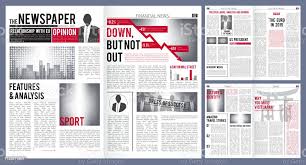
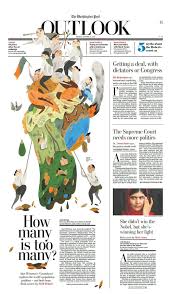
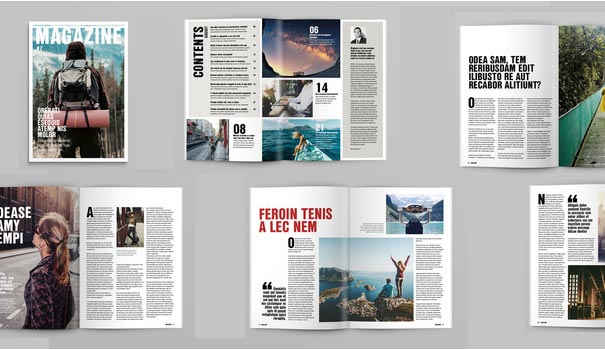
THINK & collaboratively problem solve - the3x main messages of the publication i) Auckland amazing environment, ii) Environmental issue faced relating to Water (human impact or climate change), iii) A grouping responding/action to solve issue, limit impact/consequences, restore or protect the environment (related to the issue)
e) Hand in your assessment - hard copy
DUE: Monday 8th April 2pm
Further Learning.....Assessment 1
DUE: Monday 8th April 2pm -
FOCUS / ARONGA learning intentions:
- We are FOCUSING on impact of human settlement by researching how the naming and renaming of places and features reflected European origins
- We are FOCUSING on impact of human settlement by investigating how landscapes and ecosystems were transformed over time
- We are FOCUSING on Auckland’s Water by identifying the economic and cultural values that influenced human transformation of the environment
- We are FOCUSING on Auckland’s Water by analysing the impact of changes to the environment on communities
- We are FOCUSING on Auckland’s Water by researching how Tauiwi and Tanagata Whenua cared for the environment (past/present)
Success Criteria:
Learning Activities:
- Assessment 1 - S.O.S Wai - Auckland Water Environmental Issue Investigation
Hand in your assessment - hard copy
DUE: Monday 8th April 2pm - Self and peer assessment - collaborative skills = sent Tuesday for completion privately and confidentially. This information will not be shared
- How Tanagata Whenua care for the environment? Global Studies: EP Task Protecting the Environment & Conservation https://app.educationperfect.com/app/dashboard/homework/9655687
Further Learning.....
Assessment 1
DUE: Monday 8th April 2pm-
Opened: Thursday, 21 March 2024, 12:00 AM
-
10W2 S.O.S Wai - Auckland Water Environmental Issue Investigation - Differentiated Assessment 1a AssignmentOpened: Thursday, 21 March 2024, 12:00 AMDue: Monday, 8 April 2024, 2:00 PM
-
Welcome back to Term 2! As you know, Ms. Lambert has moved on from the school to even starrier heights. I am Mr. Mitchell, your new Global teacher for the rest of the year. I will formally introduce myself in the lesson, but you are all pretty familiar with me so it won't be dramatic or anything. The main two key things to understand are: I am familiar with the assessment work you did last term, and we are capping off last term's context within Week 1, as we have a very cramped next few weeks due to the fixed date for the assessment, which I will keep you informed about.
This week will be your last pit stop on the discussion of global inequality, where we look at the haves & have nots of certain countries, and create a strong definition of what the 'global north' and 'global south' are. Where does New Zealand fit in these countries? Are we exploiters?
Success Criteria:
- I can locate different families across varied economic scales and describe their challenges unique to their income and location.
- I can show my understanding of North & South as more than geographic locations and explain their economic connotations.
Activities:
- Dollar Street - comparing families from the Top 10 and Bottom 10 countries (Supporting documents on Google Classroom)
- Global North & Global South - definitions and applying our knowledge
Follow Up Tasks:
N/A - Assessment happened in Week 1, though opening slideshow did briefly go over some work they may have forgotten over the break.
EXPLORE / TŪHURA learning intentions:
- We are EXPLORING Liveability Factors by investigating the push and pull factors that make a place liveable.
- We are EXPLORING Equity and Equality by comparing resources available to the developing and developed world.
- We are EXPLORING Equity and Equality by analysing the resources available to the developing and developed world.
-
Kia ora Year 10s, this week begins our focus for the term: Whanaungatanga, exploring the ups and downs of kinship. What happens when a society cannot form healthy connections? What issues have plagued our communities? How does prejudice take shape?
To help explore this, and prepare you for the assessment in Week 6, we are beginning our term with a broad overview of human rights. We cannot look at abuses of rights and ill treatment of minority groups in NZ without having a background understanding of what classid ideas of 'rights' are. We will delve into human rights and their origins in the atrocities of Nazi Germany and the Japanese Empire, and how human rights are widely applicable concepts that aren't necessarily backed up by law.
Success Criteria: I can/have...
- I can analyse the origin of human rights as a response to the atrocities of World War II.
- I can explain a large list of human rights as defined by the UDHR and apply it across different scenarios.
Activities:
- UDHR - WWII & Inception
- Human Rights - List of Rights (Website analysis)
Additional in-class slideshows available on request.
Follow Up Tasks:
Human Rights Scenarios - What right applies in this situation?
EXPLORE / TŪHURA learning intentions:
- We are EXPLORING... human rights by investigating its conception and history across the decades.
-
This portion of the course is where we really begin to focus on the idea of perspectives, how different people were treated due to differing points of view and different ideas of acceptable ways of life. This is the core of your assessment, regardless of whether you are picking the NCEA option or not.
This week, we are beginning our look at Chinese Aotearoa history - how racism was at the core of the Pakeha engagements with Chinese migrants, and why Chinese migrants came here to begin with. What was the first wave like? How were they treated? How did they survive? When the gold ran out, how did Chinese individuals adapt to changing circumstances?
We also look at the 'Yellow Peril' and how this attitude was not unique to Aotearoa New Zealand.Success Criteria:
- I can empathise with how Chinese workers were treated & why they came to work in Aoteroa New Zealand to begin with.
- I can define what the Poll Tax was & how it was applied to Chinese migrants.
- I will discuss how Aotearoa New Zealand socially treated Chinese people at large,
Activities:
- Chinese Migration - Part 1 (Slideshow, Google Classroom)
- Chinese Migration - Part 2 (Slideshow, Google Classroom)
Follow Up Tasks:
Political Cartoons to break down how racism was shown during the era.
EXPLORE / TŪHURA learning intentions:
- We are EXPLORING... human rights by investigating its conception and history across the decades.
- We are EXPLORING... Aotearoa New Zealand's approach to race by interpreting select case studies.
- We are EXPLORING... crime and punishment by analysing the treatment of complex individuals and groups.
- We areEXPLORING... Chinese New Zealand history by empathising with the many stories and narratives that have been woven into this country's history.
-
Kia ora class, this week finishes our look at Chinese Aotearoa and begins our focus on the Dawn Raids & Polynesian Panthers.
We will have one lesson where we look at the Gock family, a highly respected family of Chinese New Zealanders who navigated the Kumara crisis of the 1950s, becoming a success story of Chinese presence in NZ despite the obstacles of government-approved racism.
The topic of the Dawn Raids may contain some uncomfortable language and discussions of violence, but they are appropriate for your year level and will be discussed & shown tastefully. This topic is one of the most powerful moments of modern Aotearoa and the thought of the Dawn Raids still lingers with many Pasifika families today. In the interest of time, rather than talking about both topics for over a week at a time, I have decided to put them both together so we can be ready for the assessment in time. We are going to look at this pivotal part of Aotearoa New Zealand's history and the people and organisations behind it, all within a rough one and a half week span.
Success Criteria: I can/have...
- I can describe the issues facing Chinese migrants in the decades following the Poll Tax.
- I can recognise the changes towards Chinese people in NZ society, using the Gock family as a case study.
- I can summarise the economic and social changes in Aotearoa NZ during the 1950s to 1960s that directly influenced NZ's immigration policies.
- I can empathise with some of the challenges and rapidly evolving conditions facing Pacific Islanders during that time.
- I can make connections with how the Dawn Raids may have similarities to how Chinese New Zealanders were treated back then & in previous decades.
Activities:
- Stories of Success (Speed Read)
- Dawn Raids - Origins (Slideshow)
EXPLORE / TŪHURA learning intentions:
- We are EXPLORING... human rights by investigating its conception and history across the decades.
- We are EXPLORING... Aotearoa New Zealand's approach to race by interpreting select case studies.
- We are EXPLORING... Chinese New Zealand history by empathising with the many stories and narratives that have been woven into this country's history.
-
Kia ora, this is our last week before the Perspectives assessment begins. Ms. Carter and I are finalising what you will be doing, and we will make sure you have adequate time in class. 10W1 may have extra time in class for work depending on future schedule changes as you guys will lose two sessions to the teacher only day and a public holiday in the next week.
This week will be our last focus on the Dawn Raids & Polynesian Panthers, focusing more on clearly understanding the role of the Panthers as a reaction to racism, something that sprung out as a response to injustice rather than the idea that they simply 'existed'. To do this, we have three activities - a documentary on the Dawn Raids, a slideshow on the mechanics of the Dawn Raids, and a Bus Stop Activity where we look at an excerpt by Melani Anae and do delegated speed reading in five minute spans.
Success Criteria: I can/have...
- I will be able to state how the Dawn Raids were carried out, and the role of the police in them.
- I will show how the Dawn Raids directly influenced the forming of the Polynesian Panthers.
- I can say what the Polynesian Panthers were and how they put pressure on the government for their racist policies.
Activities:
- Dawn Raids & the Panthers (2005) Documentary (link here)
- Dawn Raids - Why? (Slideshow)
- Bus Stop Activity - Melani Anae, Polynesian Panthers
Follow Up Tasks:
Speed Quiz - Week 6
EXPLORE / TŪHURA learning intentions:
- We are EXPLORING... human rights by investigating its conception and history across the decades.
- We are EXPLORING... Aotearoa New Zealand's approach to race by interpreting select case studies.
- We are EXPLORING... crime and punishment by analysing the treatment of complex individuals and groups.
-
Kia ora, this was supposed to be the first week of your assessment. However, upon discussion, it was decided that this week would work as your pre-assessment week: essentially a catch-up week that will contain lots of hard work in order to get you prepared for the next three weeks.
As your assessment is about perspectives from a human rights issue, I decided that Nazi Germany and the Holocaust (a complex topic that deserves a full term of work) will be our case study for this week. We began this term looking at human rights, and we will come back to the topic that directly resulted in the creation of the United Nations.
It is also the definitive historical event of the last century, amassing more writing than any other event known to mankind. It is extremely well-documented, which makes it extremely useful for a perspectives study. We will be making a brief look at the Nazi Party and its ideals, how the Holocaust was conducted and finally, you will be writing a 200 word answer that'll test you on your ability to understand a given perspective and communicate a response to it.
In-class slideshows available upon request.
Success Criteria:
- I can understand the broad policies of the Nazi Party, and how those policies lead to the Holocaust.
- I can respond to a tough question of human rights that requires a definitive and explained answer.
Activities:
- History of the Nazi Party (1920s-1933)
- Nazi Political Cartoons
- Victims of the Holocaust
- Holocaust Timeline
- Pre-Assessment Question
EXPLORE / TŪHURA learning intentions:
- We are EXPLORING... human rights by investigating its conception and history across the decades.
- We are EXPLORING... crime and punishment by analysing the treatment of complex individuals and groups.
-
Enter text here...
EXPLORE / TŪHURA learning intentions:
- We are EXPLORING... human rights by investigating its conception and history across the decades.
- We are EXPLORING... Aotearoa New Zealand's approach to race by interpreting select case studies.
- We are EXPLORING... crime and punishment by analysing the treatment of complex individuals and groups.
- We are EXPLORING... Chinese New Zealand history by empathising with the many stories and narratives that have been woven into this country's history.
Enter text here...
-
Enter text here...
EXPLORE / TŪHURA learning intentions:
- We are EXPLORING... human rights by investigating its conception and history across the decades.
- We are EXPLORING... Aotearoa New Zealand's approach to race by interpreting select case studies.
- We are EXPLORING... crime and punishment by analysing the treatment of complex individuals and groups.
- We are EXPLORING... Chinese New Zealand history by empathising with the many stories and narratives that have been woven into this country's history.
Enter text here...
-
Enter text here...
EXPLORE / TŪHURA learning intentions:
- We are EXPLORING... human rights by investigating its conception and history across the decades.
- We are EXPLORING... Aotearoa New Zealand's approach to race by interpreting select case studies.
- We are EXPLORING... crime and punishment by analysing the treatment of complex individuals and groups.
- We are EXPLORING... Chinese New Zealand history by empathising with the many stories and narratives that have been woven into this country's history.
Enter text here...
-
Enter text here...
EXPLORE / TŪHURA learning intentions:
- We are EXPLORING... human rights by investigating its conception and history across the decades.
- We are EXPLORING... Aotearoa New Zealand's approach to race by interpreting select case studies.
- We are EXPLORING... crime and punishment by analysing the treatment of complex individuals and groups.
- We are EXPLORING... Chinese New Zealand history by empathising with the many stories and narratives that have been woven into this country's history.
Enter text here...
-
Opened: Saturday, 29 June 2024, 12:00 AMDue: Wednesday, 3 July 2024, 3:00 PM
Write a 750-800 word report answering the following focus questions on a contemporary social issue surrounding the concept of human rights. Ensure you are including multiple pieces of evidence in each paragraph (at least 3).
Make sure you leave enough time for proofreading. Regardless of whether you are doing the regular version or the NCEA version, you must submit here after submitting on GC.
-
Kia ora Year 10s, welcome back to MHJC for Term 3! This is going to be a less busy term for us than the previous term, as you will not be required to do an assessment this term - we have done our two! So with that in mind, we can take a more relaxed approach to the still-heavy amount of work we have to do this term, especially as this is your second to last term at MHJC and I want your CAT in Term 4 to be successful.
Our key focus this term is on economics, primarily filtered through tourism & the Olympics, but also with a focus on how Aotearoa economically interacts with the wider world. This week is an introduction to Ancient Greece: the ancestral home of the Olympics, and the birthplace of democracy. It is also a chance to set up the reality that a robust, developed economy is not a contemporary invention - it goes back thousands of years.
Success Criteria: I can/have...
- I can distinguish the differences politics and customs of the two most powerful Greek city-states, Athens and Sparta
- I can explain the Ancient Greek economy and what challenges and successes it had at the time
Slideshows & activities available upon request
Activities:
- Athens vs. Sparta Worksheet
- Slavery Class Discussion - why were the Greeks so reliant on it?
- Ancient Greek Economy (worksheet, class discussion)
Follow Up Tasks:
Ancient Greek Economy will likely continue into Week 2
EXPLORE / TŪHURA learning intentions:
- We are EXPLORING... the Olympics by connecting their roots in Ancient Greece to the modern day
- We are EXPLORING... historical economies and the economies of today by interpreting how they were practiced
-
Kia ora Year 10s,
Week 2 continues our trip to Greece, while getting ready for learning the history of the Olympics. We may or may not start Olympics a bit earlier than Week 3 depending on how we progress with finishing our Greek Economy work and our focus on the Greek gods & their place in Greek society. The interruption of SLC Day on Tuesday makes this a question mark.
Success Criteria:
- I can identify and explain the intricacies of the Greek gods and their place in Ancient Greek society.
Activities:
- Finishing last week's Greek Economy work
- Greek Life: Gods & Values
Follow Up Tasks:
Week 3 - Summary/Recap Activity
EXPLORE / TŪHURA learning intentions:
- We are EXPLORING... the Olympics by connecting their roots in Ancient Greece to the modern day
- We are EXPLORING... historical economies and the economies of today by interpreting how they were practiced
-
Enter text here...
EXPLORE / TŪHURA learning intentions:
- We are EXPLORING... the Olympics by connecting their roots in Ancient Greece to the modern day
- We are EXPLORING... historical economies and the economies of today by interpreting how they were practiced
- We are EXPLORING... tourism and classifying its impact on the contemporary world
- We are EXPLORING... and questioning the Olympics as important political and social events
- We are EXPLORING... and analysing Aotearoa's economic relationship with the wider world
Enter text here...
-
Enter text here...
EXPLORE / TŪHURA learning intentions:
- We are EXPLORING... the Olympics by connecting their roots in Ancient Greece to the modern day
- We are EXPLORING... historical economies and the economies of today by interpreting how they were practiced
- We are EXPLORING... tourism and classifying its impact on the contemporary world
- We are EXPLORING... and questioning the Olympics as important political and social events
- We are EXPLORING... and analysing Aotearoa's economic relationship with the wider world
Enter text here...
-
Enter text here...
EXPLORE / TŪHURA learning intentions:
- We are EXPLORING... the Olympics by connecting their roots in Ancient Greece to the modern day
- We are EXPLORING... historical economies and the economies of today by interpreting how they were practiced
- We are EXPLORING... tourism and classifying its impact on the contemporary world
- We are EXPLORING... and questioning the Olympics as important political and social events
- We are EXPLORING... and analysing Aotearoa's economic relationship with the wider world
Enter text here...
-
Enter text here...
EXPLORE / TŪHURA learning intentions:
- We are EXPLORING... the Olympics by connecting their roots in Ancient Greece to the modern day
- We are EXPLORING... historical economies and the economies of today by interpreting how they were practiced
- We are EXPLORING... tourism and classifying its impact on the contemporary world
- We are EXPLORING... and questioning the Olympics as important political and social events
- We are EXPLORING... and analysing Aotearoa's economic relationship with the wider world
Enter text here...
-
Enter text here...
EXPLORE / TŪHURA learning intentions:
- We are EXPLORING... the Olympics by connecting their roots in Ancient Greece to the modern day
- We are EXPLORING... historical economies and the economies of today by interpreting how they were practiced
- We are EXPLORING... tourism and classifying its impact on the contemporary world
- We are EXPLORING... and questioning the Olympics as important political and social events
- We are EXPLORING... and analysing Aotearoa's economic relationship with the wider world
Enter text here...
-
Enter text here...
EXPLORE / TŪHURA learning intentions:
- We are EXPLORING... the Olympics by connecting their roots in Ancient Greece to the modern day
- We are EXPLORING... historical economies and the economies of today by interpreting how they were practiced
- We are EXPLORING... tourism and classifying its impact on the contemporary world
- We are EXPLORING... and questioning the Olympics as important political and social events
- We are EXPLORING... and analysing Aotearoa's economic relationship with the wider world
Enter text here...
-
Enter text here...
EXPLORE / TŪHURA learning intentions:
- We are EXPLORING... the Olympics by connecting their roots in Ancient Greece to the modern day
- We are EXPLORING... historical economies and the economies of today by interpreting how they were practiced
- We are EXPLORING... tourism and classifying its impact on the contemporary world
- We are EXPLORING... and questioning the Olympics as important political and social events
- We are EXPLORING... and analysing Aotearoa's economic relationship with the wider world
Enter text here...
-
Enter text here...
EXPLORE / TŪHURA learning intentions:
- We are EXPLORING... the Olympics by connecting their roots in Ancient Greece to the modern day
- We are EXPLORING... historical economies and the economies of today by interpreting how they were practiced
- We are EXPLORING... tourism and classifying its impact on the contemporary world
- We are EXPLORING... and questioning the Olympics as important political and social events
- We are EXPLORING... and analysing Aotearoa's economic relationship with the wider world
Enter text here...
-
Enter text here...
EXPLORE / TŪHURA learning intentions:
- We are EXPLORING... the Olympics by connecting their roots in Ancient Greece to the modern day
- We are EXPLORING... historical economies and the economies of today by interpreting how they were practiced
- We are EXPLORING... tourism and classifying its impact on the contemporary world
- We are EXPLORING... and questioning the Olympics as important political and social events
- We are EXPLORING... and analysing Aotearoa's economic relationship with the wider world
Enter text here...
-
Kia ora Year 10s, welcome to your first last week of term at MHJC! I get it, you are kinda over the classroom experience, but we still have a lot to accomplish before the end of the term. Your big two goals for ending off the year on a good note are the CAT tests & work experience, which take place in Week 6 & Week 7 respectively.
This first week will be POLITICAL CARTOONS - we have looked at these individually, but the first week of cartoons will be about really applying your knowledge in a newer, more coherent fashion. You will be rethinking concepts of bias, irony, messaging and so on over the week as we go slowly develop our capacity to read image texts.
Success Criteria: I can/have...
- I can recount and explain world events in my own words
- I can examine the meaning and themes behind a variety of political cartoons
Activities:
- Holiday Break is Over: What's in the news? [Introductory Exercise]
- Cartoon Slideshow
- Political Cartoons - Worksheet & Analysis
Follow Up Tasks:
Political Cartoons - International
EXPLORE / TŪHURA learning intentions:
- We are EXPLORING... the Game of Life by looking at the ways wider organisations and governments play 'games', the ways they interact with each other for growths and losses.
- We are EXPLORING... and classifying essential skills and concepts necessary for future social science education
- We are EXPLORING... and conceptualising different economic and social skills needed for success outside of Mission Heights.
-
Kia ora, this week continues our focus on political cartoons - the ability to read an image for its historical and communicative intent. This week will take more of an international focus, where we look at cartoons & images abroad and try to read their messages effectively.
This week also introduces Banqer High, the self-management & finance tool that you will be using in other classes - I will introduce the Credit & Banking module this week, and Mr. Sharma & Ms. Pillay will continue with that option and introduce the Careers module soon.
A short week due to Teacher Only Day on Friday.
Success Criteria: I can/have...
- I can explain the implications and messaging of a selected range of international images
- I can understand some of the financial systems that underpin life outside of MHJC - credit & debit
Activities:
- International Images & Cartoons - Close Reading & Analysis
- Banqer High - Introductions & Playing Around + Debit/Credit Modules
Follow Up Tasks:
Reflection on Banqer High - Week 3
EXPLORE / TŪHURA learning intentions:
- We are EXPLORING... and classifying essential skills and concepts necessary for future social science education
- We are EXPLORING... and conceptualising different economic and social skills needed for success outside of Mission Heights.
- We are EXPLORING... Banqer High as a tool for self-reflection and developing the ability to organise one's life.
-
Banqer High Revision + Work Experience Planning
Kia ora students, you will be continuing with Banqer High and the modules unlocked there - with an additional focus on jobs and financial responsibility, such as the impact on student loans on your prospects within Aotearoa.Additionally, you will be starting to properly focus on work experience in Week 7: this week will begin our 'subtle' reminders about your necessary requirement & skills to be developed during Week 7. This week's activity will focus on
Short week due to Athletics on Friday.
Success Criteria: I can/have...
- I can successfully comprehend a variety of financial terms relevant to my life
- I have begun planning for my non-negotiable work experience outing in Week 7
Activities:
- Banqer High Revision Sheet
- Jobs: Positives and Negatives
Follow Up Tasks:
CAT RevisionEXPLORE / TŪHURA learning intentions:
- We are EXPLORING... and classifying essential skills and concepts necessary for future social science education
- We are EXPLORING... and conceptualising different economic and social skills needed for success outside of Mission Heights.
- We are EXPLORING... Banqer High as a tool for self-reflection and developing the ability to organise one's life.
-
CAT Revision Week
Kia ora Y10s, this is the week where we start getting *serious* about the next few weeks - this week is going to be entirely revision & skills growth, primarily done in the form of the CAT Revision Test that will take up at least two lessons. This is the week where we figure out exactly what your strengths and weaknesses are - do we need extra time for mapping, extra time for sentence construction, close reading, so on and on.I have decided that this week's work will be largely self-directed as ultimately it is your choice how well you want to do on the exam. I will be checking in with every person - and additionally with work experience - but ultimately it is your choice about the type of work you want to do and how well you apply yourself to it. The Study Guide has been explained and is readily available.
Success Criteria: I can/have...
- I can successfully prepare myself for a range of questioning on the CAT tests
- I can apply myself to developing skills like close reading & reading various types of images and environments for their meaning and/or clear unambiguous content
Activities:
- Study Guide - Containing a wide variety of activities to focus your learning
- CAT Question Guide - Section A & B
Follow Up Tasks:
Literacy Tasks in Week 5 - Close Reading
Latitude/LongitudeEXPLORE / TŪHURA learning intentions:
- We are EXPLORING... and classifying essential skills and concepts necessary for future social science education
-
CAT Revision Week Part 2
Kia ora students, this week continues our focus on CAT Revision, where we identify what skills you were lacking during last week's testing period and try bolster those skills a bit before the big test next week. Remember, AI will not be able to save you - so if you are relying on that, good luck.
Examples of criteria we may be revisiting:
Geography
- Latitude/Longitude
- Reading scales and identifying landmarks
- Rainfall
- Sea levels
- Heat wave mapping
- Erosion measurement
- Geographic scales of time
Key Reading & Writing
- Sentence Starters
- Formal grammar & punctuation
- Paragraph creation
Texts
- Close Reading
- Source Analysis
- Comparisons
- How to identify bias
- Propaganda
- Visual Texts
Success Criteria: I can/have...
- I can understand a wide range of skills and concepts that may come up in next week's test
Activities:
- To be determined per classroom needs
Follow Up Tasks:
CAT Tests!
EXPLORE / TŪHURA learning intentions:
- We are EXPLORING... and classifying essential skills and concepts necessary for future social science education
-
CAT Week
This week will be CAT Week - where you are tested on both the year's content & general skills that you should have developed over the course of your time at MHJC. This will take the course of the week - given that our CAT is the first one of the week, additional lessons in class will give you time to either prepare for other CATs or time for homework. Time will also be given to reflect on the content of the CATs & the upcoming work experience so that you can feel fully prepared for the end of the year. -
Work Experience
This will not be a regular week as there will be little if no time spent within the classroom - as you know, three days this week will be work experience, with the goal of giving a peek into life outside of Mission Heights - you will be a getting a grasp on the level of organisation, community and economy that goes into daily life. Two sessions this week - Monday, Tuesday - will be given towards finalisation & preparation.
Follow Up Tasks:
Week 8 - Reflection on the YearEXPLORE / TŪHURA learning intentions:
- We are EXPLORING... and conceptualising different economic and social skills needed for success outside of Mission Heights.
- We are EXPLORING... Banqer High as a tool for self-reflection and developing the ability to organise one's life.
-
End of Year Reflections - this is now the time we reflect on the successes and failures of the last week. Did you actually put effort into your job? Or did you fail? What did you get out of this - did you learn anything, get a job offer, or realise you had a skill you never knew you had? How did you interact with the public?
Week cut short by whanau day out.
Success Criteria: I can/have...
- I can honestly reflect on the experience of work experience and my potential successes or failures
Activities:
- In class kōrero - what's up? How did it go?
- Work Experience Reflection sheet
Follow Up Tasks:
Write here...
EXPLORE / TŪHURA learning intentions:
- We are EXPLORING... the Game of Life by looking at the ways wider organisations and governments play 'games', the ways they interact with each other for growths and losses.
- We are EXPLORING... and classifying essential skills and concepts necessary for future social science education
- We are EXPLORING... and conceptualising different economic and social skills needed for success outside of Mission Heights.
- We are EXPLORING... Banqer High as a tool for self-reflection and developing the ability to organise one's life.
-
Graduation
So long, MHJC!

